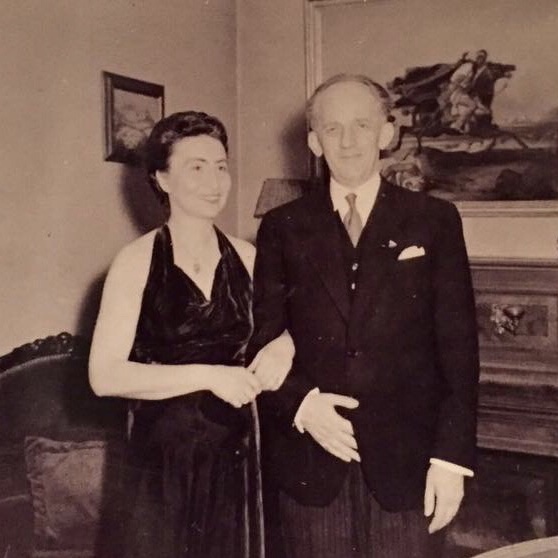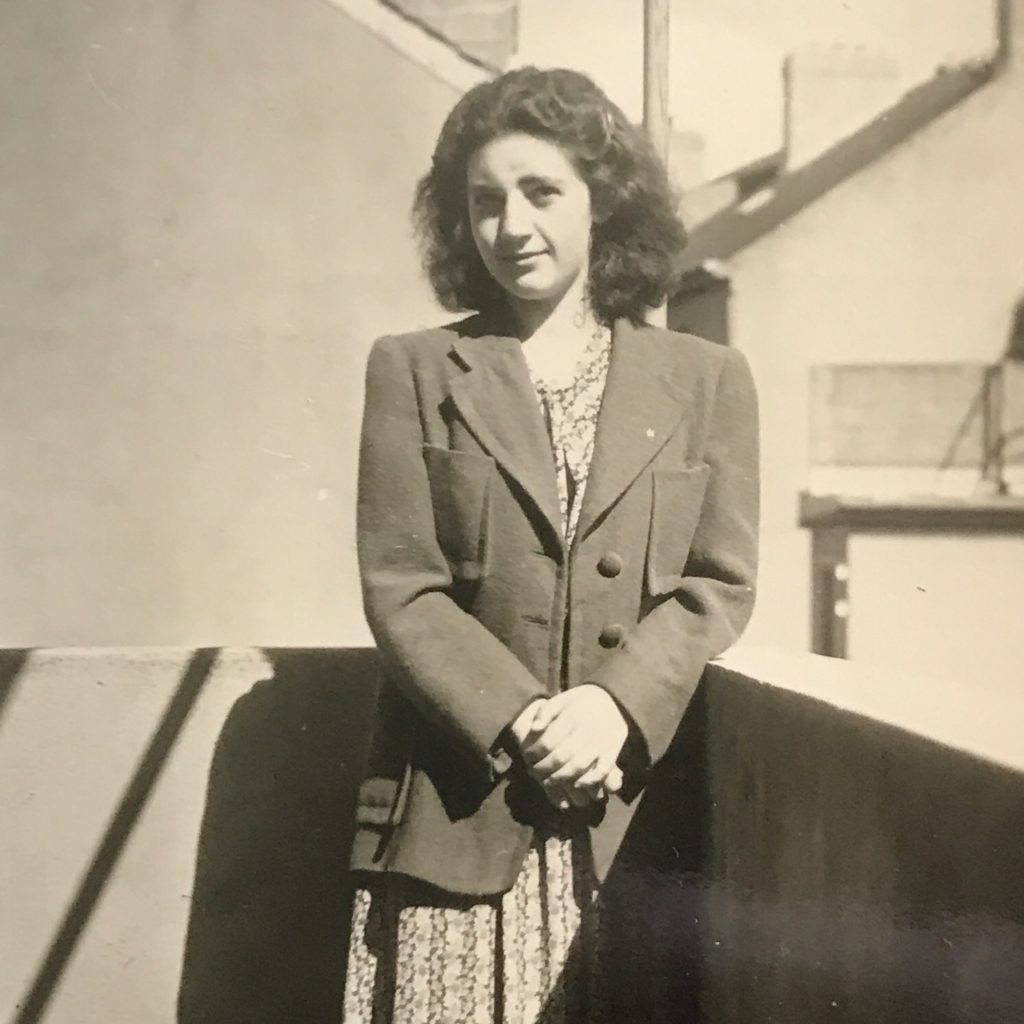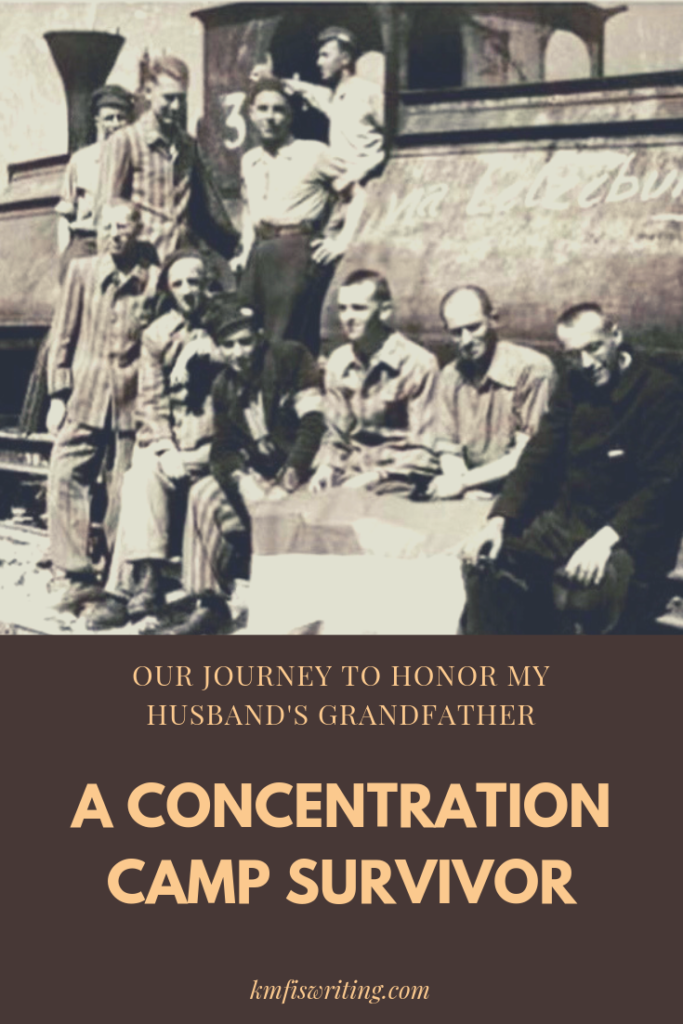First in a series: Planning a family legacy trip


Jean-Pierre Kolbach, my husband’s grandfather and son’s great-grandfather, was liberated 74 years ago on May 6, 1945 from a concentration camp in Austria. My family and I were planning a trip to Austria on the 75th anniversary of the liberation to honor him, those who died, those who survived, and the U.S. soldiers who rescued them. However, that event has been canceled due to the coronavirus pandemic.
This post contains recommended affiliate links to products or services. While you will not accrue any additional costs to support my blog, I may receive compensation if you purchase those products or services.
Editorial note and update: A reader contacted me to let me know her father, a U.S. platoon sergeant, was in the first tank that liberated Ebensee, part of the Mauthausen concentration camp network, on May 6, 1945. He was the leader of a reconnaissance team. New post in this series (with more details) now published: contains information on Mauthausen’s virtual 75th anniversary liberation memorial services. Ebensee’s memorial ceremony has been canceled due to the coronavirus pandemic.
While much of what we know (or believe) has been passed down verbally in the family, the Mauthausen Memorial organization has been very helpful in providing documentation and information. Many of the details I’m providing in this blog series are a result of my research on their website as well as information they have provided to me directly. I’ve also consulted the U.S. Holocaust Memorial Museum.
Arrested for political crimes
Jean-Pierre, and my husband’s grandmother, Madeleine, were activists in the Luxembourg underground resistance during WWII. Jean-Pierre was arrested for his so-called political crimes (distributing pamphlets), and committed to the concentration camp Mauthausen on June 5, 1943. He was transferred to Mauthausen’s subcamp Wiener Neustadt, and on Oct. 30, 1943, transferred to the subcamp Redl Zipf (code name Schlier).


According to his prisoner card, Jean-Pierre was transferred to the subcamp Ebensee (code names: Kalk, Zement, and Solvay) until his liberation by the U.S. Army 80th Infantry (aka Blue Ridge Division).
Updated with new information: It’s interesting to note that Jean-Pierre’s documentation lists his name as Johann Peter Kolbach. Learned that’s the way Nazis spelled the name.
Mauthausen and Ebensee: The concentration camps
Mauthausen was designated as a category III concentration camp – extermination by labor, especially educated prisoners and members of the higher social classes. Later, that would change as many were transported to Mauthausen when other concentration camps were evacuated from the front lines. Inmates worked (many to death) in the quarry and constructed underground production sites and tunnels to protect weapons from air raids. Gas chambers and a crematorium were constructed.
Between 1938 and 1945, 190,000+ people from more than 40 different nations were imprisoned in the Mauthausen/Gusen concentration camp network (including Ebensee). At least 90,000 of them died in these camps. More than 14,000 were Jewish.
Jean-Pierre and Madeleine: The grandparents


Jean-Pierre Kolbach was not Jewish; he was Catholic – a humanitarian who spoke up for those who could not, who acted and resisted the fascists and Nazis. Steve’s mother and grandmother (who was very active in the resistance) had to flee their home to another country during the war.


If it weren’t for the open doors and open hearts of a family in Germany, yes, Germany, it’s very likely I would not have a family.


While Jean-Pierre survived the Mauthausen and Ebensee concentration camps, I never had the opportunity to meet him as he died in 1974 when my husband was a teenager. I do cherish the great honor of knowing and loving my husband’s grandmother, Madeleine Kolbach, as my own. She passed away in 2000 at the age of 98.
Planning our family legacy trip
I don’t have all the family history and facts yet, and am discovering discrepancies in some numbers and dates. Please watch for future posts, like the one in the related posts section, as more details develop, and follow kmfiswriting as we plan our family trip to Austria in honor of our family’s legacy, sacrifice and courage. We still plan to honor him at a later date when it is safe to travel again.
History is a responsibility
It’s important that we all remember – not just those of us who were directly or indirectly affected – and never forget so that a humanitarian crisis like this never happens again. Please consider donating to the United States Holocaust Memorial Museum.
*Sources: Mauthausen Memorial; United States Holocaust Memorial Museum; family history
Pin it for later


Related posts




Please also check out Travel with Bibi’s post on How to travel through Austria on a budget.


Thank you for this lovely post. There is so much history that we do not know the details and it saddens me that this travesty happened. I look forward to reading more about your trip. Your photos are lovely.
Thank you!
Wow! What a powerful family history you’ve been exploring. I am a homeschooling mom of a 12 and 14-year old and I look forward to sharing this post with them. I look forward to reading about your trip!
Thank you so much and for sharing with your children. I’m learning so much myself.
Wow, what an awesome (and sad) story to share;, but you are right! We should always remember and honor those who have sacrificed for the good of humanity.
Thank you. A NYT report last year said that 41% of young Americans did not know what Auschwitz was. I find that so alarming.
This is so great!! I am planning to take my mom to England next year to see all of the places she “visits” every day while doing her family history.
Thanks! That’ll be a great mom-daughter experience!
I am looking forward to your future posts on your journey. It is great that you have those photos of family.
Thank you. I found it amazing that we had a copy of the newspaper photo that was captured of Jean-Pierre on the day he was liberated from the concentration camp.
Wow, what an awesome family story you have and such an amazing journey coming up next year to honor your husband’s grandfather.
Thank you. We are looking forward to this memorable experience.
Wow, this will be such an amazing trip for your family. Best of luck and can’t wait to read about it when you return.
Thank you. I’m looking forward to learning and sharing more about their story.
What a great opportunity you have to share the history of your family’s experience, thank you for allowing us to be part of it.
Thank you for wanting to be a part of this journey.
This is so cool! I love the history that you have shared and I love that you are wanting to explore your roots! Have an amazing time!!!
Thank you so much. We are looking forward to learning and sharing more.
It is a neat experience to be were your ancestors came from. I have visited a concentration camp in Germany. I wanted to see for myself, and I was forever changed. I have a slight fascination with WWII.
Thank you. It’s going to be a very poignant and memorable experience.
Isn’t it wonderful that we can look back and see the great sacrifices that our ancestors made? This family history trip is so valuable for getting to know and love them. Thank you!
Thank you! I’m in awe of their courage and sacrifice and looking forward to honoring them by sharing their story.
What a great post! Looking forward to hearing about your visit next year. I’m sure there will be so many experiences to share.
Thank you! We are looking forward to this meaningful family experience.
Love this post!!!! I really think this is a worthwhile story and thank you for sharing it.
Thank you…I’m looking forward with learning and sharing more.
You are so lucky to have all of this information! I can not wait to see more of the story!
Thank you! I’m grateful for the information we have so far and looking forward to learning more.
Wow, incredible survival story! Austria is going to be amazing! I’ve always wanted to go there
Thank you…we are looking forward to visiting as a family.
This is so interesting. They so much time in school learning about the revolutionary war, which while important, they run out of time to study this. I find this part of history a bit more interesting. High schoolers really need to learn more about it.
Thank you! I agree. A NYT article published last year said that 41% of young Americans surveyed didn’t know what Auschwitz was. Found that disturbing.
Wow! What a story. I am fascinated with World War 2 and the holocaust. It was such a tragic event but amazing to hear about people like your husband’s grandparent who stood up for what was right. I look forward to hearing about your trip.
Thank you! I’m looking forward to learning more and sharing with others.
I am such a sucker for real life historic stories!! I look forward to following along.
Thank you. I am looking forward to learning and sharing more of Jean-Pierre Kolbach’s story.
Great reminder that it wasn’t just Jews in concentration camps…that it was anyone that didn’t meet Hitler’s ideals, including political dissidents
While the Jewish people were certainly the most persecuted group targeted by the Nazis, millions of others were victimized for what they did, what they didn’t do. Jean-Pierre Kolbach was just one courageous person who did the right thing.
This is really amazing, all of the information you’ve gathered will make for a truly unique trip for your family. I can’t wait to see where you end up going and what you do!
Thank you! We are looking forward to learning more.
Wgat an important family story to share! Thanks. Great pictures!
Thank you so much. Greatly appreciate it.
Researching family history is so amazing. I think it’s interesting that Jean-Pierre’s name was changed. Coming through Ellis Island this was typical. In fact, my maiden name was changed at Ellis Island.
During my visits to Europe, I went to a concentration camp, a work camp. They are no less harsh or any less disturbing than the straight death camps. I’d suggest when planning your visit have it be the only activity you do that day. And that you give yourselves time to reflect and ‘get over’ the experience of being there. It will definitely move you.
It’ll definitely be a somber event and time to reflect as we honor those who died, those who survived, and those who rescued them. His name was only incorrect on their documents. That’s what’s interesting to find out if it was simply an error or if there was a reason behind it. Should be an interesting journey as we learn more.
I look forward to reading more about this. It is sad so many do not really understand how and why this happened. Some even said it didn’t. Sad!
Thank you so much. A reader recently reached out to me to let me know her father was in the first tank that liberated the Ebensee concentration camp. I’m looking forward to learning more about her and her father’s history and sharing more in this series.
Amazing. Over 12 million died in the camps, six million were Jewish. It’s often overlooked that it was not only Jews, but anyone who was different or resisted. I was blessed to grow up around many people who were either Holocaust survivors or children of survivors. A great place to check for more information would be Yad Vashem. They have amazing records. If you need assistance with translating from Hebrew to English, feel free to email me and I’ll be glad to help.
Thank you so much for the resource tip and your generous offer to help me with translations. Greatly appreciate it!
what an amazing journey, you and your family are on. A beautiful way to honour your ancestors by sharing their story.
Thank you so much. It’s very meaningful for all of us.
Beautiful post. And what an amazing journey for you and your family. Thank you for sharing with us
Thank you so much. Greatly appreciate your kind words.
What an wonderful family journey! It is so important to tell these stories so that history is not repeated. Your husband’s grandparents were incredibly brave to resist in the way they did. I am in awe of people who did this. How lovely that your husband’s grandmother got to cuddle your son! I look forward to reading more in this series as more details are uncovered.
Thank you so much. They were a remarkable family. I often wonder if I could have been that brave to do the right thing.
Very interesting. Thank you for sharing. When we went to Poland in 2015 we met a young man on the train, Thomas, who in telling us about himself and Poland shed tears as he remembered stories of his Jewish ancestors of the camps. As sad as it was for him to think about, I also thought it was wonderful that his parents, grandparents, etc were able to share their stories with him so we will not forget. Amazing young man… Thank you so much for sharing your story. Holly
Thank you so much for taking the time to read our family’s story. Greatly appreciate it.
What a memorable post. I would imagine possibly difficult to research/write. Agree that history is so important for all of us to keep present. Have German & Italian Grandparents who fled their homelands and fought with the Allies. That generation was amazing in all they went thru.
It truly is remarkable what that generation endured during WWII and The Holocaust. It really puts things into perspective.
What a wonderful way to honor the legacy of your husband’s family. What a sacrifice his grandfather made to try to stop the Nazi machine. Thanks for sharing this.
Thank you so much for taking the time to read about our family’s history. So grateful for those who stood up against fascists and Nazis. And grateful for those who rescued the survivors.